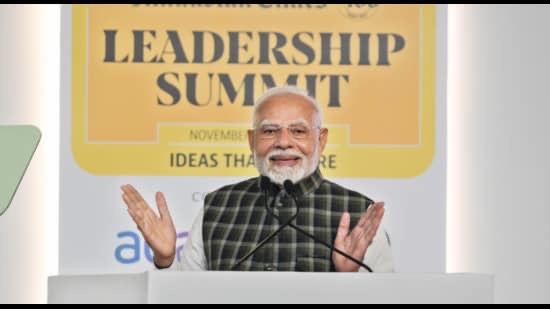Prime Minister Narendra Modi spoke about the National Democratic Alliance (NDA) government’s record in delivering public goods and welfare benefits, eschewing vote bank politics Prime Minister Narendra Modi on Saturday detailed his vision and road map to make India a developed nation by 2047, underlining public confidence in government, the belief of the ordinary citizen, and a transformation of the social mindset as crucial propellers of that journey. He spoke about the National Democratic Alliance (NDA) government’s record in delivering public goods and welfare benefits, eschewing vote bank politics, restoring public confidence in governance, and giving the administration a higher purpose – attaining developed country status by the centenary of India’s independence, August 15, 1947.
He also spoke about his government’s mantra of investment for employment, development to dignity, and of spending big on the people and saving big for the people. He urged Indians to transform their social mindset and not accept anything other than world-class standards. “We have made a long journey. From the freedom struggle to the aspirations of a post-independence India, this is an extraordinary and wonderful journey… and the people who have showed India the way forward are the ordinary citizen, and her capacity and sagacity,” Modi said. “There is a thinking and an expectation that the 21st century will be India’s century. But for this to happen, we have to work rapidly and make more effort. We are working hard towards that mission,” he added. Modi gave examples to illustrate the contribution of his government to India’s development journey, and how it boosted the capacity and trust of ordinary citizens, and their risk-taking ability. He said that at one time, experts spoke about how good economics is bad politics, and that helped cover the inefficiency of governments, and their vote bank politics.
“This created imbalance and inequality. Development was only on boards but couldn’t be seen on the ground. This model broke the citizen’s trust in government. We brought that belief back and gave a purpose to governance,” he said. He said the mantra of his administration was the progress of the people, by the people, and for the people. “And our purpose is to make a new India, a developed India. And when we embarked on this goal, citizens have reposed their trust in us,” he added. “When public confidence and self-confidence rise, an incredible impact is seen on national development.” He said the common thread between early civilisations and modern developed countries is the presence of a risk-taking culture. He said ancient India was a hot spot of global commerce, with business interests stretching from South-east Asia to the Arab world and Rome. “After independence, we had to boost this risk-taking culture. But governments at the time didn’t give the citizens confidence. So the culture of one step forward and two steps back became entrenched. Only in the last decade has risk-taking got new energy.”



